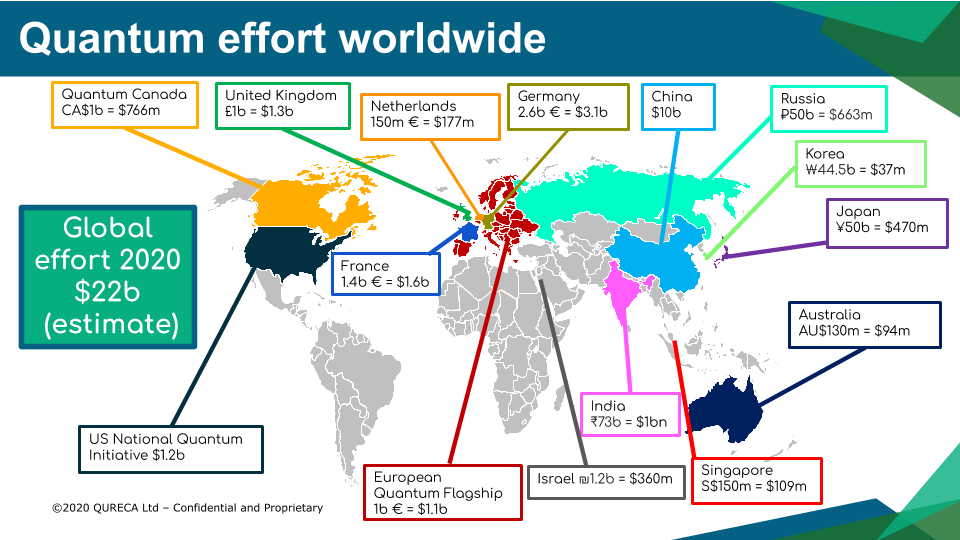by Dr. Araceli Venegas-Gomez and Ramya Mani, QURECA Ltd.
This article has been republished with permission. The original can be found on the QURECA web site here.
Over the last years there has been an exponential increase on investment in quantum technologies worldwide. The global effort for public funding has been boosted. It is an amazing and exciting time of innovation in this new second quantum revolution.
We have summarized the main programs and efforts around the world below. It is not a quantum race, it is a global ecosystem to develop the new quantum technology!

Canada

Canada is considered one of the world’s leading nations in quantum research. It has invested more than $1 billion in quantum research over the past decade [1].
Canada has a growing private sector impact, outstanding research expertise, and extensive government commitments to innovation. This places the country in a very strong position to drive quantum technology development [2].
According to an evaluation of worldwide quantum research efforts, Canada was ranked 5th globally in total annual expenditures on quantum science [3].
United Kingdom
Over the years, the UK has shown increasing participation in quantum research and development. The UK began its first five-year phase in 2015, and after it’s success, announced the second five-year phase at the end of 2019.
The first phase consisted of over £385M investment across several UK government agencies. During this phase, the UK created a vision for its National strategy for quantum technologies:
“To create a coherent government, industry and academic quantum technology community that gives the UK a world-leading position in the emerging multi-billion-pound new quantum technology markets, and to substantially enhance the value of some of the biggest UK-based industries” [4].
The five areas of focus were [5]:
• Enabling a strong foundation of capability in the UK,
• Stimulating applications and market opportunity in the UK,
• Growing a skilled UK workforce,
• Creating the right social and regulatory context,
• Maximising benefit to the UK through international engagement.
By that point, four hubs involving around 30 universities including associated companies and government organisations were established. The four research ‘Hubs’ consisted of research programmes, comprising academics with industry and government partners. They specialised on the known areas of quantum technologies: imaging, ultra-precise sensors, secure communications and new concepts for quantum computing.
During the first phase, the UK heavily invested time and resources into quantum research to look into developing sensitive gravity detectors, quantum simulators, quantum computers and miniature atomic clocks.
The establishment of a National Quantum Computing Centre was announced in 2018. Having recognised the benefits of quantum computing, this centre will be established to help the UK to evaluate, design, develop, and build a practical quantum computer [2].
Since then, investment in quantum technologies in the UK has certainly not taken a downturn, as at the end of 2019, the second phase of quantum research and development began. This phase builds on the first phase by refreshing the research Hubs to revise the agendas based on global, as well as national, developments in the field over the past five years. In June 2019, the UK government announced a further £153M investment with an industry commitment of £205 million [2]. Furthermore, there is a new focus: industrialisation of quantum technologies.
To date, the UK has invested more than £1 billion over the two phases of quantum technologies development [6].
The Netherlands
In 2019, the Netherlands published a National Agenda on Quantum Technologies with four areas of focus in quantum:
- Breakthroughs in research and innovation,
- Ecosystem development, market creation and infrastructure.
- Human capital: education, knowledge and skills.
- Societal dialogue on quantum technology.
The Agenda aims to position the Netherlands as a leading international centre and hub for quantum technology.
Many Dutch universities and knowledge institutes are leaders in the field of quantum internet, quantum algorithms, and post-quantum cryptography, thus making The Netherlands a strong player in the field of quantum research [7].
€135 million from six parties will be invested in QuTech, the quantum technology institute of the TU Delft (Delft University of Technology) and TNO (Netherlands Organisation for Applied Scientific Research), bringing the overall investment to around $150 million [5].
Germany
In 2018, the German Federal Government announced a Framework Programme to bring quantum technologies to market. They also allocated €650 million funding to its quantum technologies Programme [8].
The goals for the programme are:
- To build on Germany’s strong position in quantum physics research and pave the way towards applications using quantum technologies.
- To establish the framework conditions to prepare for new economic opportunities and markets.
- To build a solid basis for a leading role in industrial use of quantum technologies.
- To work with our international partners to ensure the security and autonomy of Germany and Europe in this important future eld
- To inform the population of Germany and involve them in the journey towards a new key technology.
In July 2020, the German government announced a €2 billion quantum effort, supplementing EU plans for €1 billion in investment through 2028 [30].
China
China is believed to be one of the leading nations in quantum information science, as the country began investing in quantum research and development very early on, by the end of the 90s.
Over the past two decades, quantum information science has received significant recognition in China, as the First Prize of National Natural Science of China in 2013 and 2015 has been awarded to this field.
By 2030, China aims to have expanded its national quantum communications infrastructure, developed a general quantum computer prototype, and constructed a practical quantum simulator.
It is estimated that the Chinese government has invested around $10b in quantum technologies, however this figure has not been officially confirmed [9].
Russia
Russian scientists have been developing cornerstones of quantum technologies for many decades. Quantum research in Russia is supported by both governmental and industrial entities [10].
The Russian government announced in 2019 that it will invest around 50 billion roubles (US$663 million) over the next 5 years into basic and applied quantum research carried out at leading Russian laboratories [11].
The primary goal of this program is to consolidate ongoing research activities in four sections:
- Quantum computing and quantum simulation.
- Quantum communications.
- Quantum metrology and quantum sensing.
- Enabling technologies.
Over 120 research experts from leading research institutions are expected to be involved with this program [10].
South Korea
The new quantum computing research in the Republic of Korea will include:
- Investment of KRW 44.5 billion ($39.7 million) for 5 years to develop core technology of quantum computing and to expand research base.
- Investment of KRW 13.4 billion ($11.9 million) in next-generation ICT technology including ultra high-performance computing knowledge data convergence, system software, software engineering, information and intelligence systems, and HCI (Human-Computer Interaction) [12].
Through the development of key technologies for quantum computing, the government plans to complete demonstration of a practical five-qubit quantum computer system with more than 90 percent reliability by 2023 [13].
Japan
The total investment for quantum information science and technology is around ¥30bn (around $280m). The main funding agencies have been the Japan Science and Technology Agency, the National Institute of Information and Communications Technology, the Japan Society for the Promotion of Science, and the Cabinet Office of the Government of Japan [14].
For example, the Japanese Government launched the Q-LEAP (Quantum Leap) initiative in 2018 to invest in R&D projects in three fields of quantum technology:
- Quantum simulation and computation,
- Quantum sensing,
- Ultrashort pulse lasers.
New Japanese initiatives have recently been launched in 2018 to advance quantum information science and technology to the next phase.
The Moonshot Project is expected to invest around ¥15-20bn to achieve its goal of creating a fault-tolerant universal quantum computer by 2050 [35].
Australia
Australia has invested AU$130m through federal funding for the development on quantum technologies [15]. State-level governments have also provided continued investment.
In 2017, two new quantum-focused Centres of Excellence were established as five year programs. The first centre is FLEET (Future Low-Energy Electronics Technologies) located in Monash University [31] and the second centre is Exciton Science located in the University of Melbourne [32].
Australia has made significant progress in increasing the public profile of quantum technology, with CQC2T (Centre of Excellence for Quantum Computation and Communication Technology) Director Professor Michelle Simmons named as Australian of the Year for 2018 [15].
The EQUS (Australian Research Council Centre of Excellence for Engineered Quantum Systems) was set up to conduct world-leading research to exploit the potential of quantum science and develop a range of transformational technologies [36].
Singapore
In 2007, the Singapore government helped to establish CQT (Centre for Quantum Technologies) that enlists physicists, computer scientists, and engineers to do basic research on quantum physics and to build devices based on quantum phenomena [16].
To date, the Centre’s researchers have published around 2,000 scientific papers, participated in projects winning over S$40 million in grants and established start-up companies. They have also trained over 60 PhD students in quantum technologies [17].
The centre is investing $25 million over 5 years in a new Quantum Engineering Programme [18].
There have also been other investments from grants and the QEP1 (Quantum Engineering Programme). This brings the total quantum expenditure to around S$150 million over the past 5 years [34].
India
The IISc (Indian Institute of Science) has a dedicated research area for quantum technology. The Initiative on Quantum Technology explores many areas such as: superconducting qubit devices, single photon sources and detectors for quantum communications, integrated photonic quantum networks, and quantum sensors [19].
This year, the Indian government has introduced a NM-QTA (National Mission on Quantum Technologies and Applications) with a total budget of INR 8000 crores (approximately $1bn) over a five year period [20].
Finance Minister Nirmala Sitharaman stated that a lot of commercial applications are expected to emerge from theoretical constructs developing in this area.
Israel
The QUEST centre (QUantum Entanglement in Science and Technology) has been established in Israel to advance the application of quantum mechanics to both fundamental and applied science [21].
A government panel in Israel is assigning 1.2b shekels ($350m) to a 6 year quantum technology program. The funding will come from the Council of Higher Education, the Defense Ministry’s Research, Arms Development and Technological Infrastructure Administration and academic institutions [22].
One of Google’s R&D centers located in Tel Aviv, Israel, is actively researching quantum computing. They hinted at a computer chip that, with the power of quantum computing, was able to manage and analyse in one second the amount of data that would take a full day for any supercomputer [23].
Europe
Around a hundred years after the publication of revolutionary ideas from Einstein, Schrödinger, and others, Europe still retains the largest share in academic quantum output [24].
The European Commission allocated €1b of funding over 10 years to launch the European Quantum Flagship [25] in 2018.
It’s main aim is to “consolidate and expand European scientific leadership and excellence in this research area in order to kick-start a European industry in quantum technology”.
The official Flagship document has been endorsed by over 3500 representatives from academia and industry, calling on the EC to invest in QT as a core future technology.
France
France invests €60 million in quantum technologies every year. The French government recently launched a a plan to structure a national strategy for quantum technologies, and estimated they would require €1.4 billion over the next five years to fund quantum research. They declared that the public sector alone cannot support this, and that the private sector will have to participate [26].
They recently announced the strategic recommendations for the 2020 plan [27]:
- Deploy cutting-edge quantum computing infrastructure for research and industry.
- Launch an ambitions technological development programme.
- Implement a programme for supporting the development of applications.
- Create an effective environment for innovation.
- Deliver a tailored economic security strategy.
- Establish effective governance.
US National Quantum Initiative
From the late 1990s, several funded IC and defense-related programs were initiated by the US government to explore how quantum could aid US National Security [28].
The NQI (National Quantum Initiative Act) was introduced in 2018, with a five year budget of over $1.2 billion. This allows federal government bodies to accelerate the growth of quantum technologies by collaborating with academic institutions and private industry [5].
NQI funding will go to NIST (National Institute of Standards and Technology), NSF (National Science Foundation), Multidisciplinary Centers for Quantum Research and Education, the Department of Energy Research and National Quantum Information Science Research Centers.
The National Quantum Initiative Advisory Committee composed of 22 experts from industry, research and federal agencies will meet twice a year to discuss quantum activities [29].
The first quantum revolution transformed the world into the highly connected, technology-driven society we see today. With the second revolution, we can expect ultra-high precision clocks, sensors for medical diagnostics and more sophisticated machine learning. Quantum devices could also enable us to see around corners, map hidden underground hazards, and easily solve problems that existing computers could not [33]. With these ground-breaking capabilities that quantum technologies bring globally, it’s no wonder why governments all over the world are eager to invest in the industry.
REFERENCES:
[1] https://iopscience.iop.org/article/10.1088/2058-9565/ab029d/pdf
[2] https://iopscience.iop.org/article/10.1088/2058-9565/ab4346/pdf
[3] https://www.economist.com/technology-quarterly/2017-03-09/quantum-devices
[5] https://outlook.stpi.narl.org.tw/pdfview/4b11410071743d5f01717b83ce980746
[8] https://www.bmbf.de/upload_filestore/pub/Quantum_technologies.pdf
[9] https://www.cnas.org/publications/commentary/chinas-quantum-future
[10] https://iopscience.iop.org/article/10.1088/2058-9565/ab4472/pdf
[11] https://www.nature.com/articles/d41586-019-03855-z
[12] https://sociable.co/technology/korea-invest-quantum-computing/
[14] https://iopscience.iop.org/article/10.1088/2058-9565/ab0077
[15] https://iopscience.iop.org/article/10.1088/2058-9565/ab02b4/pdf
[16] https://www.techinasia.com/wave-quantum-tech-startups-singapore-hopes-mark
[17] https://news.nus.edu.sg/research/shaping-future-quantum-technology
[18]https://www.quantumlah.org/about/highlight/2018-09-quantum-engineering-programme
[19] https://www.iisc.ac.in/initiative-on-quantum-technologies/
[23] https://blogs.timesofisrael.com/quantum-computing-and-israels-growing-tech-role/
[24] https://iopscience.iop.org/article/10.1088/2058-9565/ab042d/pdf
[25] https://qt.eu/about/
[26] https://www.eetimes.eu/france-has-a-quantum-plan/
[27] https://www.gouvernement.fr/en/quantum-plan
[28] https://iopscience.iop.org/article/10.1088/2058-9565/ab0441/pdf
[32] https://excitonscience.com/
[34] https://quantumsg.org/research-groups/
[35] https://www8.cao.go.jp/cstp/english/moonshot/sub6_en.html
[36] https://equs.org


















